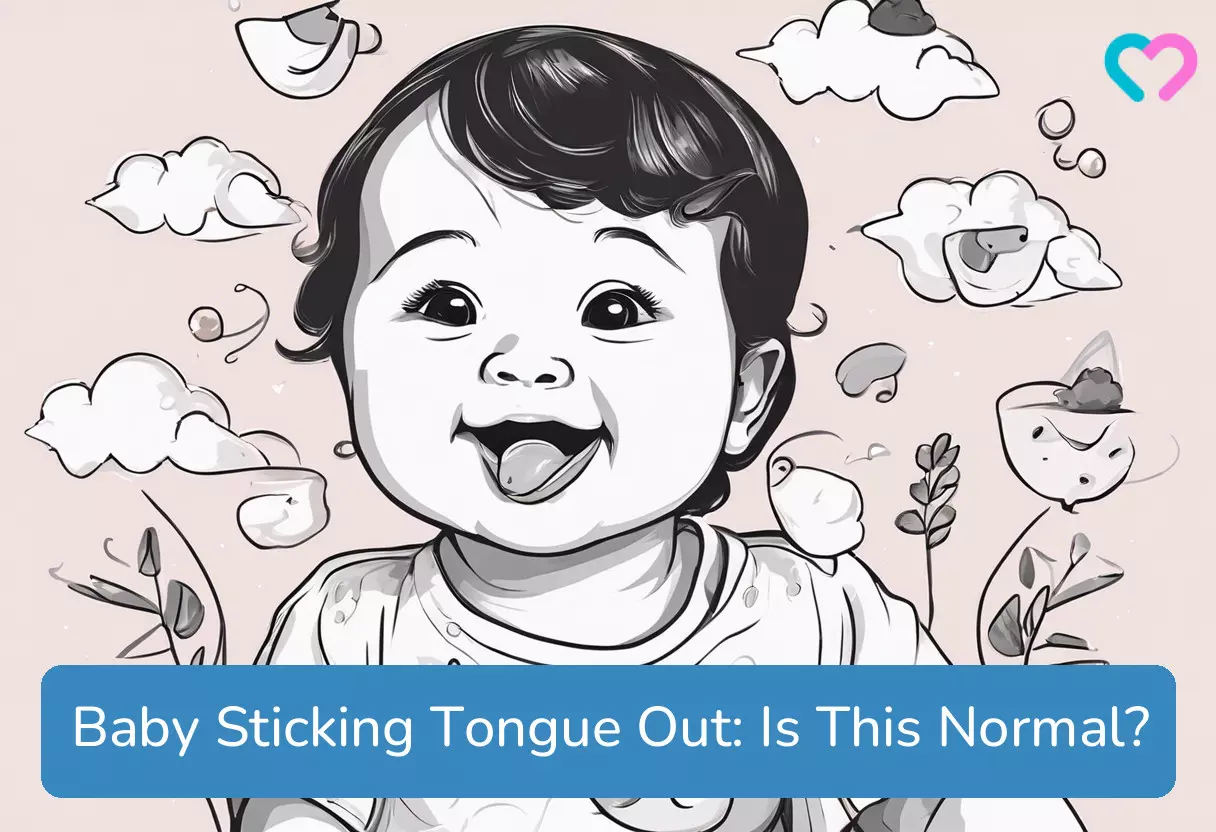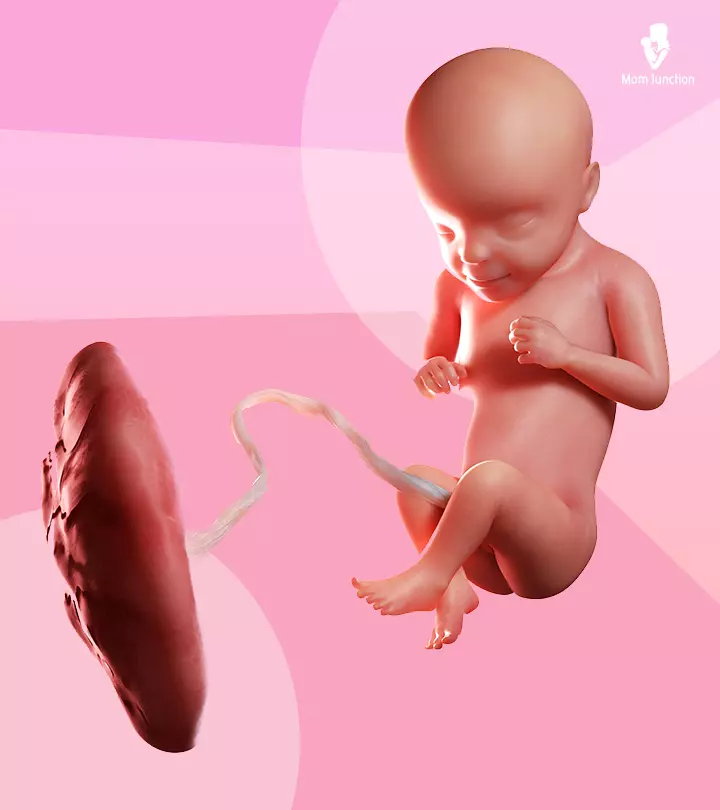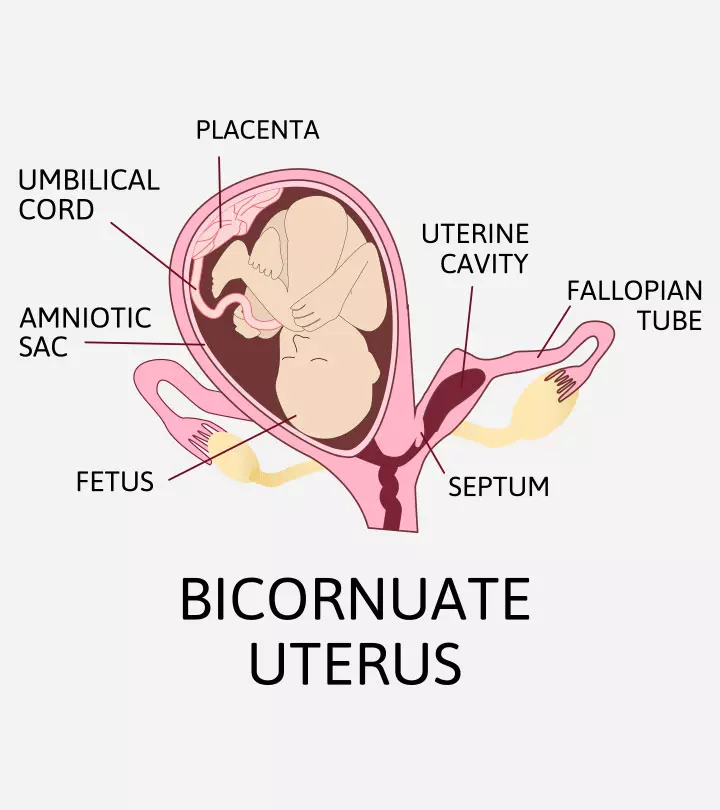
Image: Shutterstock
A baby sticking tongue out is a cute gesture but may sometimes indicate certain conditions or the baby’s requirements. The act is also called tongue thrusting and is when the baby sticks tongue out between the rows of teeth while swallowing or at rest (1).

Tongue thrusting is often a benign action but may indicate underlying problems in some cases. This post tells you about the causes of a baby sticking their tongue out and when to be concerned about it.
Key Pointers
- Babies may stick their tongues out due to innate infant reflexes such as tongue thrust reflex.
- Larger tongue, small jaws, imitation, communication, or issues with muscles are common reasons for sticking the tongue out.
- Sticking tongue out may signify autism or other developmental disorders. However, it is not a stand-alone sign of these issues.
Baby Sticking Tongue Out: Is This Normal?

Babies usually explore the world by using their mouths. Therefore, it is mostly natural and normal for babies to stick out their tongues. The common reason for babies to stick out their tongues is the tongue thrust reflex in babies. Babies are born with these reflexes. A reflex is a muscle reaction that happens automatically in response to stimulation (2).
Sticking out the tongue due to reflexes is common and seen in every healthy infant. There could be other reasons as well behind sticking out the tongue.
According to Po-Chang Hsu, MD, a medical content expert at SleepingOcean.com, “Children have a high sucking instinct and are quite active with their tongues and fingers. If your baby is sticking out his tongue, this is nothing to worry about. There are a number of possible explanations for this behavior; for example, babies are often trying to use their tongues to relieve the itching of swollen gums while they are teething, or they are discovering new parts of their body that need to be explored in a playful way.”
Reasons Your Baby Sticks Their Tongue Out
Sticking the tongue out is not always a cause for concern since it is often due to infant reflexes. The tongue thrust reflex helps the baby in sucking and latching on the nipple. Most babies outgrow these reflexes by the age of five to seven months. Remember, if you have any concerns about your baby or toddler sticking out their tongue, then do not hesitate to consult your pediatrician.
The following are other common reasons other than reflexes for babies to stick their tongues out.
The following are other common reasons other than reflexes for babies to stick their tongues out.
1. Imitation

Many elders playfully pull their tongues out to engage and bond with babies, helping them develop social and communication skills. Many pieces of research have proved that babies pull their tongues out to imitate their elders and have fun (3). Furthermore, as they grow and begin to imitate adults, babies may also attempt to communicate and express themselves through typical sounds like babbling or cooing.
Dr. Hsu observes, “Imitation plays a big part in your child’s development and is important for building relationships.”
2. Expressing their needs
The babies might pull their tongues out to convey to the mothers that they are hungry. At times, if they are full, they might put their tongues out to signal their mothers to stop feeding them.
3. Normal reflex
It might happen due to the normal sucking reflex in babies. Examples of infant reflexes that could cause a baby to stick out their tongue are the sucking reflex and gag reflex. The sucking reflex occurs when the area around the mouth is stroked. It causes the baby to move their lips and tongue in anticipation of suckling. The gag reflex happens when the back of the mouth or throat senses a solid object. It prevents the baby from gagging. It causes the tongue to stick out to expel the probable foreign body.
 Did you know?
Did you know?4. Conveying that they are not ready for solids yet

Babies tend to stick their tongues when they are being fed semi-solids by a spoon. If your baby does it, then it means they still have the gag reflex and are not yet ready for semi-solids and solids. They stop doing this once their tongues are able to push on top of the palate and able to swallow the food (4).
5. Mouth breathing
Mouth breathing can cause a baby to protrude their tongue out. A baby could breathe through the mouth due to a variety of reasons ranging from simple cough, cold, clogged sinuses, allergies, inflamed tonsils, or adenoidsiA patch of tissue situated at the end of the nasal passage, responsible for trapping harmful bacteria and viruses (5). It may also occur due to obstructive sleep apnea, which is an obstruction or narrowing in the upper airways, or central sleep apnea, which is delayed signaling from the brain to breathe when asleep. Associated symptoms in babies may include routine pauses for breaths, mouth breathing, sweating, gasping for air, choking, noisy breathing, or snorting when sleeping (6) (7).
6. Gas

Some babies might stick their tongue out while passing gas due to the discomfort and pain caused by excessive gas.
7. Macroglossia
Macroglossia is an abnormal enlargement of the tongue. Some babies might develop a large tongue due to conditions such as Down’s Syndrome, hypothyroidismiA condition that occurs due to the underproduction of thyroid hormones , orBeckwith-Wiedemann syndromeiA rare genetic disorder characterized by overgrowth of some parts of the body . At times, the large tongue might be a result of tumors or due to an injury. It might be genetically inherited, too (8). When babies have very large tongues, they cannot keep them within the mouth, so it protrudes out. Additionally, the size of the tongue in children with macroglossia may cause problems in jaw and teeth development leading to misaligned or protruding teeth and affected speech in children (8).
 Quick fact
Quick fact8. Micrognathia
Some babies have congenitally small jaws and chins and they cannot contain the tongue in their small mouths. This condition is known as micrognathia. In some infants, this condition resolves on its own by growth in the size of the mouth and development of muscles, by the age of five to seven months (5). The other reasons for micrognathia are cleft palate, and babies with syndromes like Marfan’s diseaseiA multi-system genetic disorder that impacts the connective tissues in the body , Trisomy 13iA chromosomal condition characterized by severe intellectual disability and physical abnormalities, also called Patau syndrome , Trisomy 18iA chromosomal condition characterized by abnormalities in several body parts and delayed growth, also called Edwards syndrome , Pierre Robin syndromeiA rare congenital disability characterized by a small jaw, upward airway obstruction, and displacement of the tongue , etc. (9). In this the size of the tongue is normal but the chin is small.
9. Hypotonia

Hypotonia is a low muscle tone, which can affect several muscles of the body, including those of the tongue. In such cases, the tongue hangs out of a baby’s mouth. It might happen due to various health conditions like Down’s syndrome, Prader-WilliiA rare genetic disorder responsible for multiple physical, mental, and behavioral problems , Rett syndromeiA rare genetic developmental and neurological disorder seen more commonly in females , etc. (5). However, anecdotal evidence suggests that there may be ways to strengthen the child’s tongue as they grow.
An anonymous mother of eight shares the practical way she used to strengthen her son’s tongue. Her son Felix has Down Syndrome, which causes tongue protrusion. She says, “Felix was breastfed for 18 months (which meant he had to build up some strength in his tongue because it’s harder to suck on the breast than a bottle). We have also tried to use cups, encouraging him to hold his tongue in a more natural position. He does protrude his tongue sometimes, but I think we’ll wait until he’s older and maybe remind him to put it back inside his mouth if he’s doing it excessively (i).”
10. Masses or abnormal growth in the mouth
Any abnormal growth of tissue in the oral cavity or on the tongue might take up room in the mouth. It could lead to sticking out of the tongue. A few conditions that can be responsible for it are a tumor or an infection of a salivary gland or cysts, such as thyroglossal duct cystiA fluid-filled lump or mass found in the front part of the neck (5).
11. Orofacialmyofunctional disorder
It is a group of disorders of the face and oral cavity. Tongue thrust is the most common orofacialmyofunctional disorder (OMD) (10). Sticking the tongue out due to an OMD is often due to the abnormal position of the tongue while at rest. The disorder could develop due to various reasons, such as congenital problems, family history, and even prolonged thumb sucking. In addition, when prolonged, this condition may lead to protruding teeth, open bite problems, breathing difficulties, and speech problems (11).
There are several reasons why babies could stick their tongues out, ranging from normal reflexes to indicators of a problem. However, the persistence of tongue thrust beyond infancy may lead to other complications, such as the labial inclination of incisors, open bite, and dental spacing problems (12). Consult a pediatrician if your child sticks out their tongue persistently without reason or shows symptoms like trouble swallowing, constant hunger, behavior changes, or physical discomfort.
In the next section, we address a few more queries related to sticking out of the tongue by babies.
Frequently Asked Questions
1. Is a baby sticking its tongue out a sign of teething?
Tongue thrust might happen when a baby is teething, although it is not a stand-alone sign of teething. This happens when the baby feels irritation inside the mouth. Look for other associated symptoms of teething such as swollen gums, red gums, excessive drooling, babies putting things in their mouth, and irritable nature.
2. Do babies with Down syndrome stick their tongue out?
Yes. Babies affected by Down’s syndrome have very small jaws, and they have low muscle tone. These factors cause protruding of the tongue. However, protrusion of the tongue alone should not be considered as a diagnostic characteristic of Down’s syndrome. Consult your pediatrician if you have any queries regarding your baby’s tongue-thrusting habit (13).
3. Is a baby sticking tongue out a sign of autism?
Baby sticking tongue out is not a stand-alone confirmatory symptom of autism spectrum disorders. However, it is seen along with various other symptoms in babies with autism. Consult your baby’s pediatrician if you have any doubts about the association of autism and your baby’s tongue-thrusting habit (14).
4. Does the baby’s tongue prevent them from choking?
The tongue thrust reflex in babies, where the tongue moves forward and out of the mouth, assists with feeding (only liquids) and protects against choking (15).
5. At what age does tongue thrust disappear?
The tongue thrust reflex in babies usually disappears after five to six months of age (15).
6. How do I know if my baby has tongue thrust?
Tongue thrust is a condition where a baby pushes their tongue forward between their lips during swallowing or speech, causing difficulties with feeding and speaking. Signs of a tongue thrust include protrusion when swallowing, open mouth posture, speech difficulties, and improper tongue placement (16).
7. What can I do to help with tongue protrusion?
A baby sticking their tongue out is usually not problematic and is among the many cute things babies do. It is a reflex for latching and is a normal signal to seek food, and the habit fades as the baby grows. The action may also indicate that they are not ready to transition to semi-solid food or have difficulty breathing through their nose due to nasal congestion. However, make a note of the frequency of the baby’s tongue action and look out for additional signs and symptoms. Consult a pediatrician if you are concerned about your baby’s tongue-thrusting habit.
Infographic: Why Do Babies Stick Their Tongue Out?
Babies sticking their tongues out may be due to a range of normal to problematic reasons. This infographic will help you comprehend the common causes of why an infant could stick their tongue out.
Some thing wrong with infographic shortcode. please verify shortcode syntax
Illustration: Baby Sticking Tongue Out: Is This Normal?

Image: Stable Diffusion/MomJunction Design Team
Personal Experience: Source
MomJunction articles include first-hand experiences to provide you with better insights through real-life narratives. Here are the sources of personal accounts referenced in this article.
i. Tongue Protrusion in People with Down Syndrome;https://felixsmum.blogspot.com/2012/08/tongue-protrusion-in-people-with-down.html
References
1. Dr. A.VasanthaKumariet al., Breaking the Tongue Thrusting Habit: When Compliance Is Essential- A Case Report; World Journal of Research and Review
2. Infant reflexes; U.S. National Library of Medicine
3. Meltzoff AN et al., Re-examination of Oostenbroek et al. (2016): evidence for neonatal imitation of tongue protrusion; U.S. National Library of Medicine
4. Feeding Guidelines for Infants and Young Toddlers: A Responsive Parenting Approach; Healthy Eating Research Organization
5. Baby Sticking Out Tongue; New Health Advisor.org
6. Sleep Apnea in Infants and Newborns; Sleep Foundation
7. Sleep Apnea in Babies: Symptoms, Diagnosis and Treatment; Children’s Mercy, Kansas City
8. Macroglossia; National Organization for Rare Disorders
9. Micrognathia; Cleveland Clinic
10. Tongue Thrust; Intermountain Healthcare Organization
11. Sejal S Shah et al; (2025); Orofacial Myofunctional Therapy in Tongue Thrust Habit: A Narrative Review; National Center for Biotechnology Information
12. Tahereh Jalaly et al; (2009); Effect of Tongue Thrust Swallowing on Position of Anterior Teeth; National Center for Botechnology Information
13. Facts about Down Syndrome; Centers for Disease Control and Prevention
14. Fares S. Al-Sehaibany, Occurrence of oral habits among preschool children with Autism Spectrum Disorder; U.S. National Library of Medicine
15. Feeding Development and Difficulties; The Royal Children’s Hospital Melbourne
16. Tongue Thrust; Rady Children’s Hospital San Diego
17. Swallowing Exercises: How to Do Tongue-Strengthening Exercises; Johns Hopkins Medicine
18. Tongue Thrust; Johns Hopkins Medicine
19. Athraa Ameer Ali, Dina Hamid Obaid; (2025);Tongue Thrust: A Review; University of Baghdad
20. Gurusaravanan Kutti Sridharan; Venkata R. Rokkam(2025);Macroglossia; NCBI
Community Experiences
Join the conversation and become a part of our nurturing community! Share your stories, experiences, and insights to connect with fellow parents.
Read full bio of Dr. Mubina Agboatwalla

Dr. Po-Chang Hsu is a medical doctor and medical content expert. He received his medical degree from Tufts University School of Medicine in Boston in 2016. Previously, he did a master’s degree at Harvard University and wrote a thesis on neuroimaging in schizophrenia patients at Brigham and Women’s Hospital. He currently works at Alpas Wellness.
Dr. Po-Chang Hsu is a medical doctor and medical content expert. He received his medical degree from Tufts University School of Medicine in Boston in 2016. Previously, he did a master’s degree at Harvard University and wrote a thesis on neuroimaging in schizophrenia patients at Brigham and Women’s Hospital. He currently works at Alpas Wellness.
Read full bio of Dr. Ritika Shah
Read full bio of Rohit Garoo
Read full bio of Shinta Liz Sunny
















